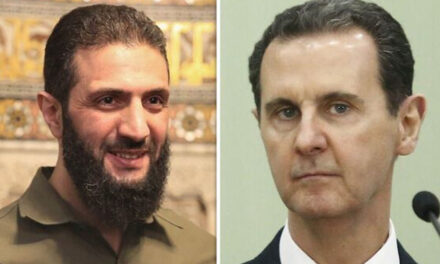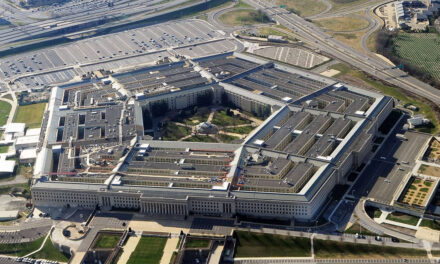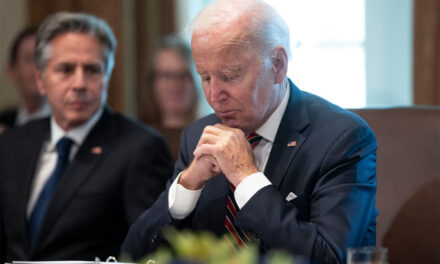
Is a two-state solution even possible?

The notion of two peaceful co-existing nations in the Middle East – with one the State of Israel, a Jewish nation, and the other a State of Palestine, an Arab Islamic nation – has been a goal since the founding of Israel back in 1948.
There was no Palestinian two-state solution back then because most of the Arab nations would not recognize the right of Israel to exist. How can you enter into an agreement when the Arab world would not accept the existence of one of the two states?
After many years and several wars, most Arab nations have come to accept the reality of Israel and its right to exist. The major hang-up in formalizing that fact has been the prerequisite that there must first be a two-state agreement between the Palestinians and Israel before any progress could be made.
The greatest obstacle to a two-state agreement has been, and is, the Palestinians – particularly Hamas in Gaza. Their official charter calls for the eradication of Israel. As long as the Palestinian governing bodies would not agree to the existence of Israel, no two-state solution was doable. Even President Obama – who was more sympathetic to the Palestinians – could not advance his two-state policy over the obsessive desire of Hamas and others to crush Israel.
Rather than beat that old dead camel, President Trump abandoned the two-state requirement — which led to productive negotiations with several Arab states. Without the proviso that there must be the two-state agreement before any other nations could normalize relations with Israel – officially accepting its right to exist as a Jewish state – progress was made.
The result was the unprecedented Abraham Accords, in which four Arab nations – The United Arab Emirates, Bahrain, Morocco and Sudan — signed cooperation agreements with Israel. In terms of Sudan, it was also a peace agreement since that nation was officially in a state of war with Israel at the time the Accords were signed. Saudi Arabia was about to sign a similar pact with Israel.
Hamas and the hardliners appear to have misjudged their influence and the view of other Arab nations. They seemed to have assumed that the Arab world would continue making the two-state option a condition for normalizing relations with Israel. It has now been shown that several Arab nations were more than happy to see the two-state issue taken off the table so they could proceed with bilateral negotiations with Israel.
While the Arab world has been critical of the Israeli response to the Hamas attack, that appears to be largely political rhetoric for domestic consumption. The condemnation of Israel is little more than diplomatic posturing. What those other Arab nations say is belied by what they do – or more accurately, what they do NOT do.
Under Hamas leadership – and to a lesser extent under the Palestinian Leadership Authority in the West Bank – the Palestinian people are outcasts in most of the Arab world. Their problem is not exclusively with Israel. The Abraham Accords showed that Arab nations were not happy to have their relationship with Israel hampered by a two-state prerequisite. Once Trump took that proviso off the negotiating table, progress was made stabilizing the situation in the Middle East. That progress has been only temporarily paused as the War proceeds. Saudi Arabia is still expected to still enter into an agreement with Israel. Other Arab nations are expected to follow suit.
Even more telling of the Arab world’s disfavor of the Hamas-led Palestinians is the fact that no other Arab nation is willing to allow Palestinian refugees into their countries – not Egypt, not Jordan, not Hezbollah in Lebanon, not Saudi Arabia, not Syria, not Iraq and not even the leaders of Iran, who are sponsoring the Hamas terrorism. They do not give a rat’s ass about the people of Palestine as long as they are controlled by Hamas.
The Palestinian PEOPLE are not even cared for by Hamas, who see them only as pawns in their ongoing genocidal terrorist campaign against Israel – only as shields and as useful collateral damage in the international public relations game.
Hamas never used billions of dollars in aid for the benefit and protection of the Palestinian people. Even as the hospitals were being impacted by lack of fuel and medical needs, Hamas horded fuel, food and medical supplies. The people of Palestine are suffering and dying in a war that would never have happened had it not been for Hamas’ heinous attack on Israel. Worth re-emphasizing. All the suffering and death among the Palestinian people would NOT be happening were it not for the madness of Hamas.
Until the Palestinian people are led by a responsible governing body more interested in the welfare of the people and the stability of the Middle East than in the destruction of Israel and the extermination of Jews, there can be no two-state option even put on the table for serious negotiation. Until Palestinian leadership joins the majority of the Arab world in recognizing and accepting the existence of the Jewish State, there can be no consideration of a Palestinian State. Until that changes, the most prudent course of action is bilateral agreements with individual Arab nations – which is likely to proceed despite the war of Hamas.
Hamas is a pariah among the nations of the world – even most of the Arab nations in the Middle East. The terrorist organization is an agent of the regime in Iran – as are most other Islamic terrorist groups. Middle East terrorism is a single organic political and military operation headquartered in Tehran. Wiping out Hamas is a battle victory, but the terrorist war will continue. Palestinians will not have a homeland – will not have peace — as long as the terrorist leaders in Tehran are allowed to control Gaza with puppet terrorist governments like Hamas.
Civil War General William Sherman notably said, “War is Hell.” But even with that in mind, the worst outcome is to allow Hell to win. That is what is at stake in this battle between Israel and Hamas.
So, there ‘tis.



























IMO — yes to the two State question. But that would make it harder for Israeli’s to encroach on Palestinian land. I think, in the past, it’s the Palestinians who turned this down, but I am not sure what the deal actually was. But not a good sign.
Yes to skipping the two state solution and offering Israeli citizenship to Gaza and The West Bank, however they would make up 20% of the electorate so while they probably could not vote to takeover the country, they certainly would be a major force in Israeli politics.
I am pretty sure without one of these solutions or a perfect alternative, someone like Hamas will rise again as people really can not live with apartheid. Which is what Palestine has today. I also do not share Horist’s opinion of the Abrahams Accords. While better than not, they are not that much better off with them. As of yet. After three years. And now a war.
The Abrahams Accords are a significant achievement in that a number of Arab States, and Israel, said they would place nice. And then in the three years since, most say: ” lacks a substantive, core achievement.” That is, UAE, Bahrain, and Morocco, said they would normalize relations with Israel, a nice way of hinting they won’t bomb them or support terrorists to do so. At least that’s what they said. Not sure what happens if they don’t. Sudan may have joined by now and Bahrain/Israel diplomats were pulled at the start of the war, so I guess they are out for now because they stand with the Palestinians (not Hamas). No issue apparently changing your mind either.
Egypt and Jordan have normalized relations with Israel for 40 and 30 years, respectively. It’s worked out.
There is some economic activity with Israel and UAE, but that has been going on for years, yet expansion is a good thing. There’s even a kosher deli in UAE for Israel’s to delight in. And Israel is selling arms like no tomorrow — like close to a billion dollars a year which seems like a bad thing to me.
The $3B Abraham fund is a bust so far. Trump never got it off the ground.
UAE and Israel opened an oil depot in Israel that will probably kill the Red Sea. It’s oil for Europe, not the US.
There’s been some gala’s, rugby games, and the like but most Arabs feel the Accords are a bust, economically speaking.
Still, better than no Accords and the Egypt/Jordan precursor proves the profit. Hopefully things will pick up Abrahams wise, but given the war, I doubt it, at least not soon. The three major problems with the Accords are 1) we are in it and 2) economic traction and because of this, the big one: 3) Arabs overwhelming support Palestine. And therein lies the rub with expanding the Accords, or even just making them work to be beyond nice words and actual economic actions. I do not share Horist’s glowing self-serving accolades.
Bottom line: Israel and Palestine need more than an accord, they need to end apartheid. If not, we will revisit violence at a later date. As it always has been with apartheid.
All true Frank. A July 2023 article (which is pre-Israel-Hamas War now) stated that around 82 percent of people in the Middle East region are not in favor of the AA for a variety of reason, but the article cites five reasons. See *https://www.bakerinstitute.org/research/five-reasons-why-abraham-accords-are-ceding-ground-arab-iranian-de-escalation*
Reason #5 below is “Changing Regional Context”
However, the period of American supremacy in the Middle East appears to be ending. Although the U.S. is still the most powerful external actor in the region, its position is unraveling and increasingly being challenged by Washington’s main rivals, especially China, in a new era of multipolarity. While the Gulf states will still likely look to the U.S. as a partner, they could be less deferential than in the past as they assert more autonomy in their decision-making. This has already been seen in numerous ways, including ignoring the U.S. position on the war in Ukraine, collaborating with Russia in manipulating energy markets through OPEC+,[39] drawing closer to China as a strategic ally,[40] and normalizing ties with Syria’s Bashar al-Assad in opposition to U.S. demands,[41] among other things.[42] This trend does not augur well for the U.S.-sponsored normalization project.
Iran seems to be the real power broker in the region. Everybody is scared of Iran and what they will do if people start being nice to Israel. Funny thing to me is how many Arab countries listen to Iran and Iranians are not even Arab, they are Persian.
One state of Israel? – A majority Jewish state?
Doubtful as a fair representation – not only for the 20+% Arabs,
but also for the Sephardim, the Eastern European Jews, the North African ones, the Ethiopean ones.
And where do we put the Kahanistas, Likud, and the land-thieving “Settlers” in this?
Two states: Palestine and Jewish Israel?
See above Israel (including Sephardim, the Eastern European Jews, the North African ones, the Ethiopean ones?)
and Palestinian Gaza and West Bank? – separated and easily oppressed?
Better a FEDERATION of:
Genezareth – Samaria – Jordan – Juda – Gaza with JERUSALEM AS FEDERAL CAPITAL (with evenly split council)
A Federal Congress of two chambers – with fair representation)
JOSHUA’S OLD SYSTEM (and Netayahu’s copy of it): “NO MAN, WOMAN, CHILD DID WE LET LIVE” MUST GO!
A two-state solution??? Never happen! If it does, a BIG mistake. There will never, I say again, never be peace. How can Israel have peace with people who are determined to eradicate the Jews. And for those who would support a two-state solution, I suggest reading Genesis and Joshua. It’s there and other places in the bible that describe the land of Israel and that God gave that land to the Jews.
NO! . . . This is ISRAEL’S land, CLEAR and SIMPLE. Tell HAMAS to go somewhere ELSE, or risk EXTINCTION.
The article is wrong. There are now 13 million Palestinian natives who are descendants of those who owned 100% of land in 1920 when Palestine was created by the Treaty of San Remo and the Treaty of Sevres.
There are only 7 million Israelis. So then clearly anyone talking about a 1 state solution has to be either talking about genocide of the Moslem majority, or the total elimination of the state of Israel.
A two state solution is also possible, but clearly it has to include the Right of Return of the 2 million native Arabs who were illegally evicted from their homes in Israel by terrorist gangs like Irgun.
The Palestinians in GAZA and the West Bank represent about 20% of the Israeli population; I believe Kirk’s numbers include Palestinian diaspora in other surrounding countries, which makes either citizenry or two state solution more complex.
You can not negotiate with Terrorists. The only way to stop them is to eliminate them to the last man.
I agree Larry. I just hope Israel has a post-victory plan for Palestinians that is not a return to the Apartheid style form of rule they were engaged in pre-war. And again, I still think something needs to be done about Iran but have no idea what should be done. I am pretty sure that Hamas while it is a physical organization, it is also an ideology. History I think will show that another Hamas will arise when the ideology is not beaten. And the only way to beat an ideology is another, better, ideology.